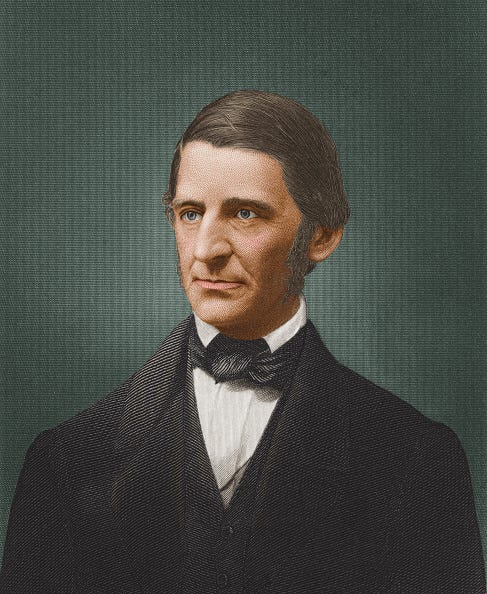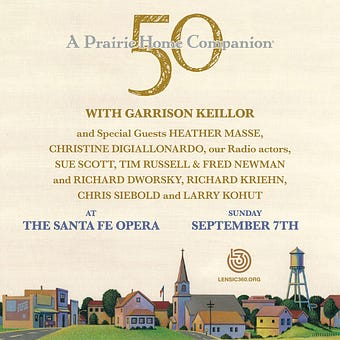|
 |
The Writer's Almanac from Sunday, May 25, 2014
"Monet, Van Gogh, at Home" by Norita Dittberner-Jax from The Watch. © Whistling Shade Press, 2008.
ORIGINAL TEXT AND AUDIO - 2014\
It's the birthday of the man who said, "Live in the sunshine, swim in the sea, drink the wild air." That's Ralph Waldo Emerson, born in Boston (1803). His father, who died when he was eight, was a Unitarian minister, as were many of Emerson's family members before him. He was a quiet and well-behaved young man, not an exceptional student. He graduated in the middle of his class, studied at Harvard Divinity School, and got a job as a ministerial assistant at Boston's Second Church. Not long after his ordination, he was married. He was happy at home and in his work, and soon he was promoted to senior pastor.
Two years after Emerson was married, his wife, Ellen, died of tuberculosis, at the age of 19. He was devastated. He began to have doubts about the Church. A year after Ellen's death, he wrote in his journal: "I have sometimes thought that, in order to be a good minister, it was necessary to leave the ministry. The profession is antiquated. In an altered age, we worship in the dead forms of our forefathers." He took a leave of absence and went on vacation in the mountains of New Hampshire. By the time he returned, he had decided to resign from his position as minister.
Ralph Waldo Emerson wrote: "Finish every day and be done with it. You have done what you could; some blunders and absurdities no doubt crept in; forget them as soon as you can. Tomorrow is a new day; you shall begin it serenely and with too high a spirit to be encumbered with your old nonsense."
It's the birthday of poet Theodore Roethke, born in Saginaw, Michigan (1908). His father, Otto, and his uncle Charles ran a floral company that their own father had started. The brothers had large greenhouses in their backyards, and young Theodore spent his days weeding and harvesting moss for floral baskets. Many years later, he wrote to a friend: "The greenhouse — my symbol for the whole of life, a womb, a heaven-on-earth."
Roethke graduated from high school and college and went on to graduate school at Harvard. He had always loved to write, and now he started writing poetry. One night while walking through Harvard yard, he spotted a respected professor and approached him with his work. The professor invited Roethke to his office the next day, and after reading his poems, exclaimed, "Any editor who wouldn't buy this is a fool!" Roethke was overwhelmed: "I felt I had come to the end [...] of a trail. I had learned how to get high grades, but that seemed meaningless. Now I didn't have to go into advertising [...] or the law. I wasn't just a spoiled sad snob. I could write and people I respected printed the stuff."
The Great Depression took its toll, and Roethke dropped out of Harvard to teach at Lafayette College, and finally the University of Washington. In recommending him for the University of Washington, the president of Bennington wrote: "He is an extremely complex, temperamental and somewhat eccentric person. If the University of Washington can take his eccentric personality, it will acquire one of the best teachers I have ever seen."
Roethke was a big man, 225 pounds. He was fascinated by gangsters, and he even talked like one — he had a deep voice, a growl. He was manic-depressive, and he often drank too much. He wore fur coats and drove big cars. As a teacher, he was persuasive and emotional. When he wanted his students to write a description of a physical action, he told them to describe what he was about to do, then climbed out the window onto a narrow ledge and inched his way around the whole classroom, making faces at every window. He insisted students memorize poems so that they would have something to call on when they were going through a tough period in life. He continued teaching throughout his career.
His books of poetry include The Lost Son and Other Poems (1948), The Waking (1953), and The Far Field (1964).
Be well, do good work, and keep in touch.®
Now this is a place to visit! Join us in Santa Fe as we bring a full A Prairie Home Companion performance to the world-renowned Santa Fe Opera House.
The Santa Fe Opera’s site is like no other. Early on, TIME magazine called the complex “one of the handsomest operatic settings in the Western Hemisphere.” To The New Yorker, it is a “miracle in the desert.” More recently, The Washington Post dubbed it a “shining white cloud in the red hills.” And the Philadelphia Inquirer has lauded it as “one of the most beloved venues in the country.” With recent major renovations now completed, such tributes carry even more power.
The Santa Fe Opera House
Sunday, September 7
7:00 p.m. (Gates 6:00 p.m.)
If you are a paid subscriber to The Writer's Almanac with Garrison Keillor, thank you! Your financial support is used to maintain these newsletters, websites, and archive. If you’re not yet a paid subscriber and would like to become one, support can be made through our garrisonkeillor.com store, by check to Prairie Home Productions, P.O. Box 2090, Minneapolis, MN 55402, or by clicking the SUBSCRIBE button. This financial support is not tax deductible.

